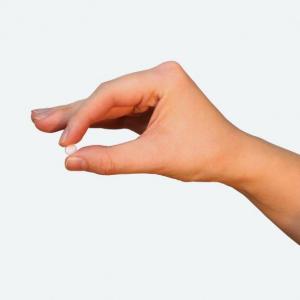
Find out what helps with hand tingling and how to start with the remedy

What Really Helps with Tingling Hands? Let's Look for Answers Behind a Symptom That Can Change Everyday Life
Tingling in the hands is an uncomfortable sensation that can appear suddenly, linger for a long time, or keep coming back. Many people have experienced it at least once – after waking up, after long hours sitting at the computer, or during sports. But what if occasional tingling becomes an everyday problem? What helps with tingling hands and how can we determine what causes it?
There can be multiple causes, and it's often difficult to identify them precisely. Sometimes it's something completely harmless, other times tingling can be a sign of a more serious health issue. The first step? Learn to listen to your body, pay attention to it, and respond promptly.
When Hands "Tingle" - What's Really Happening?
Tingling, medically known as paresthesia, results from irritation or disruption of nerve pathways. It can be due to temporary pressure on a nerve (such as sleeping on your hand) or a symptom of inflammation, a herniated disc, diabetes, or carpal tunnel syndrome. Sometimes tingling is accompanied by loss of sensitivity, weakness, or pain, which can regularly disrupt even simple daily activities – like holding a pencil, typing on a keyboard, or carrying a shopping bag.
For instance, Jana, a thirty-year-old teacher, noticed that her fingers started "turning off" while writing on the board. At first, she attributed it to fatigue, but when tingling began waking her up at night, she started investigating. It turned out to be the beginning of carpal tunnel syndrome, which required a change in habits and targeted physiotherapy.
Common Causes and How to Address Them
Tingling hands can be caused by something as simple as sleeping on an arm, but also by serious nervous system disorders. Some of the most common causes include:
- Carpal Tunnel Syndrome – primarily affects people who work long hours on a computer or perform repetitive wrist movements. It involves compression of the median nerve in the wrist. Changing ergonomics, wearing night splints, or physiotherapy can help.
- Herniated Disc in the Cervical Spine – pressure on nerve endings in the neck area can cause not only tingling but also pain radiating into the arm.
- Diabetes – high blood sugar levels can damage nerves, leading to conditions known as diabetic neuropathy.
- Deficiency of Vitamins B12 and B6 – these vitamins are essential for the proper functioning of the nervous system. Their deficiency can cause unpleasant neurological symptoms.
- Stress and Nervous Tension – psychological strain affects the entire body. High tension can lead to muscle tightening and subsequent pressure on nerves.
In some cases, tingling is induced by less known causes, such as chronic heavy metal poisoning, autoimmune diseases, or Lyme borreliosis.
Try our natural products
What Helps with Tingling Hands According to Experts?
Help begins with accurately identifying the cause. If tingling recurs, it is advisable to visit a neurologist who will conduct necessary examinations – such as electromyography (EMG), which determines how nerves conduct signals. However, even without examinations, we can take several steps that may bring relief.
Lifestyle changes are the first thing that can bring visible change. If you spend long hours at a computer, check if your chair and desk are set at the correct height, and try to stretch your hands and neck regularly.
Regular exercise and stretching help keep muscles flexible and nerve pathways free. Simple exercises for the wrist, neck, and shoulders can be performed even at the work desk – and often prevent the condition from worsening.
Natural dietary supplements focused on the nervous system, such as B vitamins, magnesium, or omega-3 fatty acids, can help improve nerve regeneration. For example, vitamin B12 is known for its positive effect on nerves and is often recommended for neurological issues.
In some cases, physiotherapy or massages help relieve tension in the cervical spine or wrist area. For instance, dry needling, a method known from physiotherapy, is used to release deep muscle spasms that may press on nerves.
Ergonomic aids, such as a vertical mouse, wrist pad, or back support, can significantly reduce joint and nerve strain when working at a computer.
People often underestimate the impact of sleep. Sleeping on an unsuitable pillow or in a position that presses on the arm can lead to repeated nighttime tingling. Check if your pillow is the correct height, and avoid sleeping on your stomach with your hand under your head.
Tingling Hands Due to Stress? Not as Uncommon as It Seems
A special chapter is the impact of stress and psychological strain. In stressful situations, the body produces increased amounts of cortisol, which can lead to muscle tension and restricted blood flow. The result? Cold extremities and light tingling that one initially attributes to a physical cause.
When combined with a lack of exercise and poor lifestyle, a vicious circle is created. In such cases, mindfulness, breathing exercises, or yoga, which combine physical relaxation with psychological stabilization, can help.
A sensitive area is also tingling in pregnant women, which often occurs in the third trimester due to water retention and tissue swelling, compressing nerves. Here, it's important to consult with a doctor, but it is usually a temporary problem that disappears after childbirth.
When to Pay Attention and Consult a Doctor?
Occasional tingling isn't immediately a cause for concern, but there are times when you should pay attention – for example, if it is accompanied by muscle weakness or loss of coordination, if the tingling sensation gradually spreads throughout the body, if it occurs after a fall on the head or back, or if you start losing sensitivity in the hand and have difficulty holding objects.
In these cases, seeing a doctor as soon as possible is necessary – it may be a sign of a serious neurological disorder.
The Natural Way – How a Healthy Lifestyle Can Help
It's not just about eliminating a symptom, but about long-term improvement of overall health. A diet rich in fresh foods, plenty of exercise, quality sleep, and low stress levels are foundations that significantly affect the functioning of the nervous system.
For example, regular consumption of leafy vegetables, nuts, seeds, and legumes provides the body with the necessary substances for nerve renewal. It can also help to eliminate processed foods, excessive sugar, or alcohol, which burden the nervous system.
The path to improvement can be gradual, but for most people, combining different approaches – from ergonomic adjustments to exercise and relaxation techniques – leads to noticeable improvement within a few weeks.
One of the best pieces of advice is: "Listen to your body before it forces you to stop." Because it is the timely response to subtle warnings, like tingling in the hands, that can be crucial.
In conclusion, remember that even though tingling might seem like a small issue, it is a signal that can reveal various health aspects – and often, it takes little to improve the situation. Whether you opt for ergonomics, natural supplements, or professional help, the key word remains prevention.







